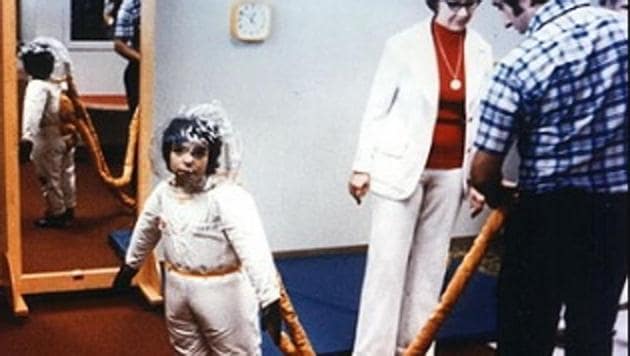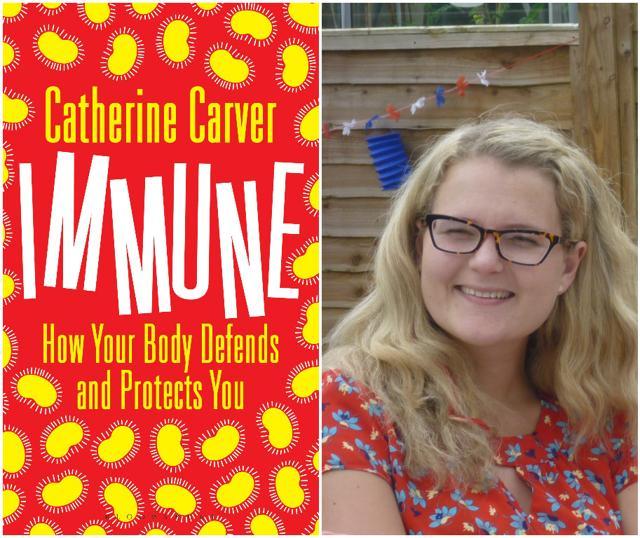Born without an immune system. This is the story of the boy who lived in a bubble
In her book Immune, science writer Catherine Carver explains how the human immune system works. This excerpt, from the chapter Defenceless, is about David Vetter, an American boy who was born with Severe Combined Immunodeficiency (SCID).
David Vetter was a much-anticipated and much-loved baby. He came into the world crying and screaming like any other newborn, and for 20 whole seconds he lived in it like the rest of us. Sadly, that’s where the normal bit of the story ends. David was carefully enclosed in a specially built plastic bubble where he would spend the rest of his days. The exceptional nature of his existence would lead to incredible scientific discoveries during his 12 years on Earth, but also long after his death. However, perhaps the most important facts to remember are that David’s favourite colour was purple, he adored Star Wars and he used to hide pencils in an attempt to play hooky from school. He was an ordinary kid thrown into an extraordinary way of life because he had no immune system.

David was born with Severe Combined Immunodeficiency (SCID, pronounced ‘skid’ ). This genetic condition meant David was unable to make his own T cells or Natural Killer cells, and the B cells he made were completely non-functional. He was therefore ‘immunodeficient ’and unable to fend off the most minor of infections, transforming even the common cold into a potential killer. David ’s parents were all too aware of the dangers of SCID, having already lost another son, also by the name of David, to SCID when he was just seven months old. After the death of their first son, doctors warned the Vetters that if they conceived another boy there would be a 50 per cent chance he would suffer from SCID. On finding out their next child was a boy the devoutly Catholic couple declined the option of a termination and instead did everything humanly possible to ensure a germ-free birth for their baby. They placed their faith in the ideas of an Experimental Biology professor by the name of Raphael Wilson. He suggested that if a child with SCID could be preserved in a germ-free environment long enough for a matching bone marrow donor to be found, it might be possible to cure them.
Preparations for the birth were almost as involved as trying to plan a military campaign on the moon. Three connecting operating rooms were closed for three consecutive days of intense deep-cleaning. The afternoon before the procedure, signs were erected to divert the normal surge of human traffic away from the corridors nearest the theatres, to minimise the number of germs hitchhiking to the area. The members of staff carefully hand-picked to perform the caesarean section were swabbed and sampled to within an inch of their lives. Any found to be carrying infection were told to stand down and were replaced with a contagion-free colleague. The super-clean team had to work together as one well-oiled machine, with the ability to operate in complete silence while barely moving. This part of the plan was to minimise the movement of air in the room to reduce the risk of microbes parachuting from the air to land on David. The bizarre nature of this requirement shouldn’t be underestimated. Operating rooms are normally alive with the sound of communication as surgeons, nurses and anaesthetists exchange instruments, information and ideas. In this case, the team were forced to replace this rich rhythm of conversation with a blanket of silence punctuated by a complex mime of nods and eye movements devised purely for this operation.
The medical team weren’t the only ones entering into the unknown. The prospect of giving birth is often stressful, but surely never more so than for anxious mum Carol Vetter in the days leading up to 21 September 1971. She was not exempt from the germ eradication precautions, and had to sleep on sterile sheets, eat sterile food and scrub her entire body with an anti-bacterial soap. Unlike any other expecting mum, surrounded by excited friends and family, she was isolated and only allowed to speak to people on the telephone. When the predefined morning of David’s birth arrived, Carol was wrapped in sterile sheets (a feeling she later likened to being mummified) and her tummy was scrubbed for a solid 10 minutes to wipe out any microbes and make it as pristine as skin could ever be.
Finally, preparations for the germ-free sanctum were complete. There was one more unusual step before scalpel could touch skin: 15 minutes of complete stillness and silence. This was to ensure the air would be as motionless as possible to minimise the number of microbes that might be carried on the breeze of a whisper or the gesture of a hand. The time had come. The operation began and, moving slowly but precisely, the surgeons cut David out of his blissfully clean cocoon and hauled his vulnerable little body into the real world.
Newborns are normally swiftly handed to their mum to begin the bonding process through skin-to-skin contact, but David was delivered into the waiting arms of his bubble. The bubble had been prepared as carefully as the operating theatre, with filtered air flowing past a pile of sterile diapers, sterile medical equipment and even sterile holy water. A blood test was taken and for two long weeks the Vetter family waited and prayed, hoping that this David was in the safe 50 per cent. Unfortunately it was not to be and the test results revealed that David had indeed inherited SCID. Devastating as this was for them at the time, the extreme precautions taken by Carol and the medical team had at least given David a chance at life.

Nobody predicted just how unique a life it would be, because nobody anticipated David would wait so long for a matching donor. The team had always seen the bubble as a short-term stopgap, but without a bone marrow match they were faced with an almighty list of unanticipated everyday problems to solve. For instance, how do you make sterile toothpaste? They tried autoclaving it (heating it) to kill any microbes in it, but it turns out super-heated toothpaste has more in common with concrete than a dental hygiene product ever should. They considered bubbling gases through the toothpaste but concluded the most likely outcome was one giant exploding toothpaste bubble. So they didn’t do that. The ultimate solution came not from cutting-edge technology, but from the past: salt and baking soda. In the years before commercial toothpaste, this combination was used to keep our pearly whites in tip-top condition and it worked for David too.
David ’s teeth were also aided by the fact that without an immune system this little boy lived his life having to be shielded from ice cream, cake and Coca-Cola. Up until the age of five his mum would bake a cake and blow out the candles, but the birthday boy himself couldn’ t eat the unsterilised sugary goodness because there was a very real risk it would kill him. On his fifth birthday a cake was found which could be safely sterilised, and David enjoyed his first mouthful of birthday cake (albeit a vacuum-packed version in a can). Another of David’s long-standing ambitions was to drink Coca-Cola. Having watched people on TV enjoying the fizzy drink he asked if he could have some. Staff tried experiments to make his wish come true but the heating process ruined the bubbles and the taste. When David was finally taken from his bubble in the last few days of his life one of his first requests was to finally drink Coca-Cola. Sadly he was deemed too sick to risk it and died never having tried it.



